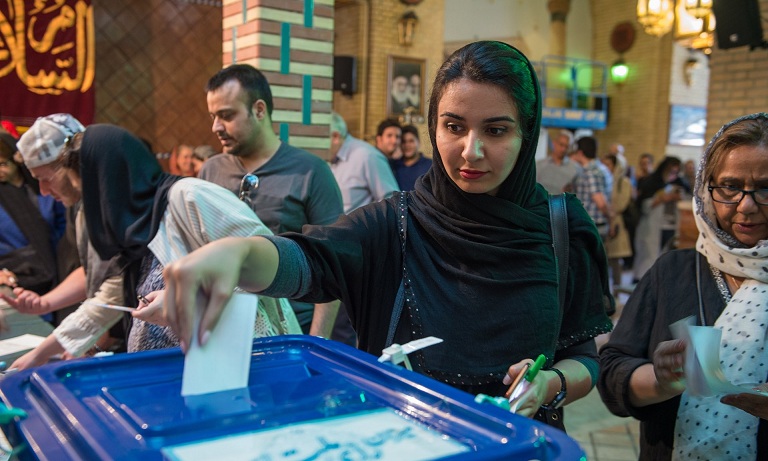Today Iranians cast their ballots to elect the country’s twelfth president, the result of which will affect not only the future of the country but also the forthcoming struggle over who will become Iran’s next and third Supreme Leader.
“Active participation of the people in elections strengthens Iran’s national security,” said the 68 year-old Shia cleric and incumbent President Hassan Rouhani, during a press conference held immediately after he voted.
While Rouhani has widespread support throughout the country, he is running against hardliners like Ebrahim Raisi, the Combatant Clergy Association party’s candidate, former Vice President and Minister of Heavy Industries Mostafa Hashemitaba, and former Minister of Culture and Islamic Guidance Mostafa Mir-Salim. Regional experts say Iran’s Supreme Leader, Ayatollah Ali Khamenei, although not explicitly, supports Raisi.
Caspian News spoke to residents of Tabriz, the capital city of Iran’s East Azerbaijan province, to gauge voters’ opinions of the four candidates and the likely outcome.
Bahram, a 34 year-old taxi driver from Tabriz, said the election will most probably see Rouhani win a second term.
“In Iran the incumbent has always won a second term. Rouhani will not be an exception to this, and I believe he will win,” Bahram told this reporter.
“He has done a lot for Iran since he was first elected in 2013. The economy is reviving, tourism has been gradually getting back to the good old days,” he added. “We Iranians believe that Supreme leader Ali Khamenei supports Rouhani. This can also be crucial to Rouhanis’s possible victory.”
While the country has a popularly elected president, the government is dominated not by an executive presidency but a theocratic figure known as the Supreme Leader, who is elected for life by a body of 88 Islamic clerics and scholars called the Assembly of Experts. Final decisions on matters of policy, amongst other things, rest with the Supreme Leader and not the president. Since the founding of the Islamic Republic of Iran in 1979, the country has had only two Supreme Leaders: Ayatollah Ruhollah Khomeini and the current Ayatollah Ali Khamenei.
Some in Tabriz are disinterested in the election, like Karim, a 46 year-old vendor in Tabriz, who says he ignores elections because, he believes, all the candidates are the same.
"Is there any point to go to the polls and vote for what is one of several incompetent men who will do nothing for the country? I'm not interested in elections, it is a waste of time for me,” Karim said. “We need a man who will take care of our well-being, Iran's today and future."
Reza, a 24 year-old student from Tabriz, said that while Rouhani has his support, he does not mind a good political fight between the candidates.
“I personally support Rouhani,” Reza said, reflecting an attitude that seems to be common amongst younger, more educated Iranians. “But I want to see other candidates battling him for votes,” he said. “This will be really interesting to see.”
Hasan, a 62 year-old resident of Tabriz said he plans to definitely vote.
“I will cast my ballot for the best candidate in my opinion. That person is the incumbent, Rouhani,” Hasan told this reporter enthusiastically.
“Our country, let me say, ‘blossomed’ during his first term. I hope he wins a second term," Hasan said.




 President Ilham Aliyev shed light on the evolving contours of the peace process with Armenia during an international conference in Baku this week. ...
President Ilham Aliyev shed light on the evolving contours of the peace process with Armenia during an international conference in Baku this week. ...
 Azerbaijan and Armenia started the process of demarcation of their border on Tuesday, with the installation of the first border markers based on ge...
Azerbaijan and Armenia started the process of demarcation of their border on Tuesday, with the installation of the first border markers based on ge...
 Armenian sappers commenced on Monday mine-clearance operations in the territories adjacent to the Saint Mary Church in village of Voskepar (Armenia...
Armenian sappers commenced on Monday mine-clearance operations in the territories adjacent to the Saint Mary Church in village of Voskepar (Armenia...
 Iran and Pakistan have signed eight cooperation documents in various fields, and agreed to strengthen ties to fight terrorism in the region.
Iran and Pakistan have signed eight cooperation documents in various fields, and agreed to strengthen ties to fight terrorism in the region.
 As the conflict between Ukraine and Russia escalates, the strategic importance of Kharkiv, Ukraine's second-largest city, has come sharply into focus.
As the conflict between Ukraine and Russia escalates, the strategic importance of Kharkiv, Ukraine's second-largest city, has come sharply into focus.
 President Aliyev emphasized the critical role of the North-South Transport Corridor in fostering transport cooperation between Azerbaijan and Russi...
President Aliyev emphasized the critical role of the North-South Transport Corridor in fostering transport cooperation between Azerbaijan and Russi...



